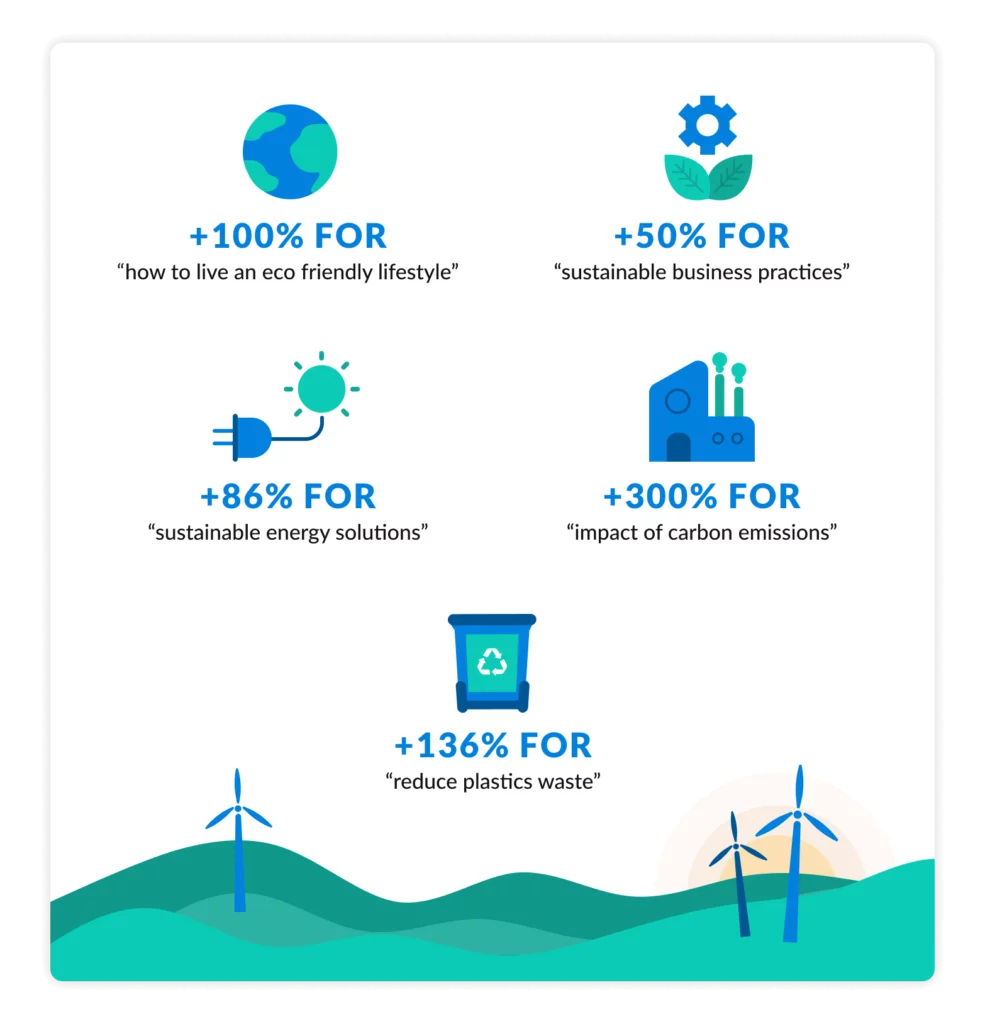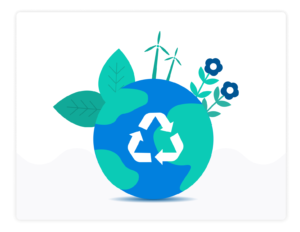Blog: How Can Businesses Be More Sustainable?
Table of Contents
How can businesses be more sustainable? What is the business case for sustainability? These are questions many marketing leaders are forced to answer, whether they like it or not, because there is growing interest in sustainability among consumers. This article will highlight key sustainability trends, how businesses can be more sustainable, and examples of sustainability in business.
Sustainability Trends
As digital marketers, we are constantly thinking about search trends. What are people searching? How do these trends affect our clients and their marketing efforts?
A hot topic lately (no pun intended) has been environmental sustainability. With the passing of the Inflation Reduction Act, increase in extreme weather, and growing corporate sustainability movement, these issues are becoming more and more present in our day-to-day lives.
Over 80% of people say sustainability is more top of mind now than pre-pandemic.
This heightened interest is clear when we look into Google Ads search data; people and businesses around the globe are looking for ways to reduce their environmental footprint.
These searches positively trending year-over-year from August 2021 to August 2022 are prime examples:

These sustainability trends beg the question: how does the increased focus on environmental sustainability impact business?
What is the impact of sustainability on business practice?
Many consumers are on a quest to live more sustainably and support responsible brands. More executives understand the business case for sustainability and are placing increased emphasis on their own green efforts and evolution. Employees desire to work for companies aligned with their values.
These interests and values found in various stakeholders exemplify the impact of sustainability on business practice – how businesses are hit on all sides by the importance of and push for better-for-the-world corporate action.
Consumers’ Growing Interest in Sustainability
Consumer behavior is shifting, with a growing preference to buy from and support businesses that care about our planet and its people. According to Nielsen, 81% of consumers feel companies should be helping to improve the environment.
People also are trying to be better stewards for the environment themselves, which brings them to companies who sell sustainable goods and services. Think about the google searches highlighted above. Over the past five years, there has been a 71% rise in online searches for sustainable goods globally.
In retail, for example, growing interest in sustainability products has not been met by businesses. This has presented an opportunity for businesses to bolster reputation and increase profits. It has also hurt those who have fallen behind the curve or made false claims. For example, H&M’s bout with greenwashing accusations has resulted in damage to the brand.
It’s not just consumers engaging more with brands that align with a sustainable mission. B2B sustainability is growing, too.
B2B Sustainability on the Rise

Environmental impact is top of mind for many companies’ leadership, boards, and investors – in fact, 90% of executives think sustainability is important. This could make it easier to pitch a business case for sustainability to senior leadership.
The 2019 UN report on sustainability suggests that “sustainable business practices” have made significant inroads into the business strategy of forward-thinking CEOs. From individuals to activists, think tanks, business, and political leaders – all have woken up to the idea of mainstreaming sustainability.
These parties know that sustainable companies are often more transparent, values-aligned partners who ultimately perform better.
Companies that have their own sustainability goals and agenda will buy from businesses that share these values.
As the sustainability in business movement grows, so will the importance of being sustainable in driving sales and brand loyalty from other businesses and consumers alike.
Employees Value their Company’s Sustainability Efforts
Workers are becoming increasingly conscious of, and are placing an increasing amount of importance on, the values of their employer. This, in tandem with the rise in people caring about the environment, plays a major role in the attraction, retention, and engagement of talent.
Employee Attraction and Sustainability
Employees are willing to make sacrifices in order to work for more values-aligned companies, plain and simple. People are willing to be paid less and even leave their current jobs to work for sustainable companies.
- 71% of employees view environmentally sustainable companies as more attractive employers
- Most Millenials (which will make up 75% of the workforce by 2025) are willing to take a pay cut to work for environmentally friendly companies and nearly 40% have already taken a job for a company’s sustainability efforts
- 59% of employees leaving their job leave to find work with more responsible companies.
Employee Retention and Sustainability
Sustainability efforts have also been found to help retain talent and maintain higher levels of well-being on the job.
While the exact numbers vary slightly depending on the study you are referencing, the bottom line is that employees report that they would be much more likely to stay with a company that strives to make a positive impact on the environment.
People also tend to be happier and more stress-free when working for companies with a perceived higher purpose.
Employee Engagement and Sustainability
Not only does sustainability bring in and keep top talent, it motivates and inspires employees in their work. In a values-aligned and proactively eco-friendly company, workers will develop a sense of pride, belonging, and purpose. This will influence work ethic and dedication.
Want to take it a step further? Bring your employees in on your sustainability efforts. Nearly 90% of employees engaged in their company’s sustainability work report that it enhances sentiment about the company and overall job satisfaction.
In short, a business’ sustainability efforts can help build a high-performance team.
Going Green Saves Money
In addition to increased sales and employee engagement, prioritizing sustainability helps companies save money.
For example, reducing energy consumption and increasing energy efficiency saves utility costs. Recycling old products into new ones saves on materials. Tax credits can be granted for green efforts such as renewable energy and reduced emissions. Employee retention reduces turnover costs. And the list goes on.
Overall, becoming an environmentally friendly company can have a positive effect on business in the short and long term.
Sustainable Business Examples
There are a lot of examples of sustainable businesses out there that can inspire us.
These companies use their platforms to drive change. They understand the importance of sustainability in business and are defined by their mission statements, transparency, and certifications.
Numi Tea
Numi sells Fair Trade, ethically sourced, organic teas, herbs, and spices. The B Corporation and Climate Neutral Certified business is reducing waste by using 90% recycled content in their boxes and compostable tea bags.
Not only that, Numi amplifies its impact with the Numi Foundation – a nonprofit created by the Numi Tea founders to nurture and empower communities in their local area Oakland, California and around the globe.
Tablas Creek
Tablas Creek is the United States’ first Regenerative Organic Certified vineyard. This means the California winery revitalizes its land and surrounding ecosystems when producing its wine.
It’s one thing to mitigate impact – its another to leave the planet better than you found it.
Tentree
Tentree is a B Corp and Climate Neutral Certified clothing brand that – as the name implies – plants 10 trees for every purchase. To date, the company has planted over 81 million trees, removing millions of tons of CO2 from the atmosphere.
Plus, Tentree focuses heavily on the sustainability of its materials and ethics of its factories, as well.
Accenture
Accenture may seem like a strange addition to this list of sustainable business examples. However, the multi-national consultancy is a great example of a service-based company that has started to embrace sustainability. Accenture offers robust sustainability services in addition to its general consulting services. The business has also committed to short-term carbon footprint reduction and making investments in a low-carbon future.
How can businesses be more sustainable?
All businesses are unique and will go about their sustainability journeys in different ways. Not to mention, there are a lot of avenues to be more environmentally friendly!
However, here is a list of tactics and sustainability practices any business can take inspiration from to be more sustainable:
1. Measure Your Carbon Footprint & Set Goals
Understanding the kind of impact a business makes on the planet now can help inform where to prioritize work going forward.
Organizations such as Carbon Neutral Certified and Carbon Neutral Collective help businesses, whether they are sustainable pioneers or just getting started, measure their carbon footprint, purchase offsets for their emissions, and develop emissions reduction plans.
2. Embrace remote work
Remote or hybrid work provides an opportunity for great sustainability benefits.
Skipping on the drive to the office saves people, on average, 3.2 pounds of carbon per year – the equivalent to 8500 miles in a car or a flight from Hawaii to DC. Companies also save on electricity and other office-related impacts.
However, remote and hybrid companies must be aware that remote work is not necessarily greener. Since remote work started taking off in the COVID-19 pandemic, the average number of trips taken and residential energy use are on the rise.
Companies can become a lot more sustainable by opting for remote work, but they will have to also embrace and encourage employee sustainability from home.
3. B2B Spending
Whether a company is deciding where to source materials in its supply chain or partnering with a digital marketing agency, choosing a company that values environmental sustainability goes a long way when thinking about how can business be more sustainable.
Everything a business purchases factors into its impact. B2B purchases are no different.
4. Limit Plane Travel
Air travel accounts for 2.5% of global carbon emissions. Flights are incredibly energy intensive and a major source of carbon emissions for companies.
Think: can this event be as effective virtually? Are there alternative modes of transportation that employees can use? And, if plane travel is important for a certain occasion, purchasing carbon offsets for your employees can balance out the negative effects of the flight.
5. Employee Engagement
Engaging employees in eco action and education has many benefits.
It poses an opportunity to come together around a common cause. Green teams and green initiatives have been shown to improve employee engagement and morale. This kind of engagement can also strengthen company sustainability initiatives creating a more united, dedicated workforce.
Finally, especially if your company is remote or hybrid, your office sustainability is spread across your employees’ desks. Educating employees on their own impact can then reduce yours.
6. Use Certification Platforms as Inspiration
Even if becoming a B Corporation – a business that values people and the planet as much as profit and commits to sustainable business practices – isn’t the end goal, B Lab’s B Impact Assessment is free for anyone to use.

Businesses can use this tool to gain a better understanding of where they are strong and where they can improve in all aspects of responsible business.
Plus, the B Corp Directory can help companies find inspiration in what B Corps in its field are already doing.
7. Digital Sustainability
It may be surprising to you, but the internet has a major impact on the environment. Namely, the energy needed to maintain the storage of data, images, and other content is enormous.
The internet emits 1.6 billion annual tons in greenhouse gas emissions and is projected to make up 20% of the world’s electricity consumption by 2025.
Thus, a business’ website can play a major role in its environmental footprint. To remedy this, look for green website hosts that use renewable energy to power the storage data.
Proper Search Engine Optimization (SEO) and efficient, fast website development can also go a long way. A leaner site with less code and server requests will emit far less per visitor than bulkier sites.
How Silverback Approaches Sustainability
Just like many others, Silverback also believes in the importance of sustainability in business. We are on our own sustainability journey.
- Silverback has remained a completely remote-friendly company with employees working all over the country since the COVID-19 pandemic in 2020.
- We come together for an annual company-wide retreat. This past retreat in 2022 we chose a sustainable venue at the Eaton in DC – a Regenerative Travel Hotel with Gold LEED certified building. We also offset 7.68 tons of carbon from all employee plane flights.
- In July 2022, we had ESG investment options added to our retirement portfolio.
- In the spring of 2022, the Green Gorillas, Silverback’s sustainability and social impact task force, was created. 12 employees from all levels and departments of our agency sit on the task force and it meets regularly to help Silverback be more environmentally conscious.
- The Green Gorillas have engaged employees on environmental issues with initiatives such as a how to work from home sustainably lesson, an eco-challenge, and monthly newsletter tips and employee spotlights.
There are many ways Silverback can continue to improve our environmental sustainability. We are excited to grow our own eco-friendly practices while benefiting our business and our employees at the same time.



